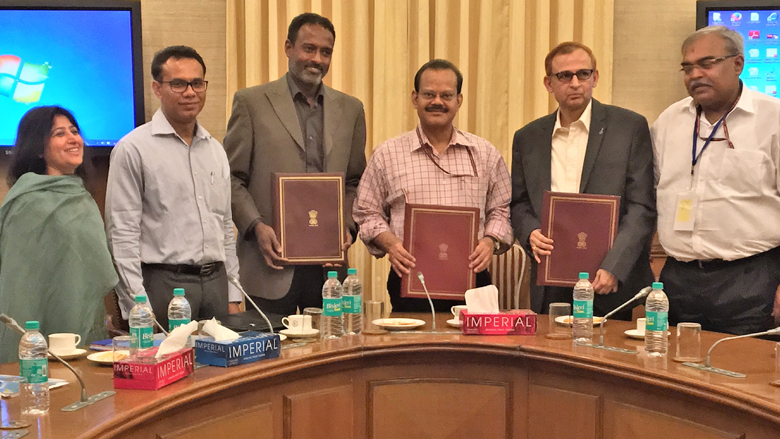NEW DELHI, March 22, 2017: The Government of India, the Government of West Bengal and the World Bank today signed a US$ 210 million loan agreement to strengthen Gram Panchayats (GPs) – the lowest tier of rural local governments – to better utilize the untied/discretionary funds that are now available to them.
The agreement for the West Bengal Support to Institutional Strengthening of Gram Panchayat Program – Phase II (ISGPP-II) was signed by Raj Kumar, Joint Secretary, Department of Economic Affairs, Ministry of Finance, on behalf of the Government of India; Soumya Purkait, Special Secretary, Panchayat and Rural Development Department and Project Director ISGPP-II, on behalf of the Government of West Bengal; and Hisham Abdo, Operations Manager and Acting Country Director, World Bank India, on behalf of the World Bank.
“Following the recommendations of the 14th Central Finance Commission and the 4th State Finance Commission, aggregate fund flows to Gram Panchayats (GPs) would substantially increase. The Program will support GPs in the state to effectively utilize the untied funds, and will strengthen local communities’ participation in the planning, budgeting, and financial management of projects in rural areas,” said Raj Kumar, Joint Secretary, Department of Economic Affairs, Ministry of Finance.
During the first phase of this Program (ISGPP-I), performance-based block grants (PBG) were given to 1,000 better performing GPs within nine districts for investing in priority local infrastructure and service delivery projects. Out of the 92,000 activities carried out by the GPs using ISGPP grants, 54 percent were on transport, 23 percent on water and sanitation, and 20 percent on public buildings. Similar activities are envisioned under ISGPP-II for all 3,342 GPs, with expected economic benefits including employment generation and increased efficiency in spending.
“Bringing the state closer to citizens is important for India’s economic development. Effective and accountable Panchayati Raj Institutions empowered with additional resources can help deliver on this promise.” said Hisham Abdo, Operations Manager and Acting Country Director for India. “Drawing on this principle, the Program aims to build the capacity of PRIs to respond to service needs of citizens across West Bengal,” he added.

